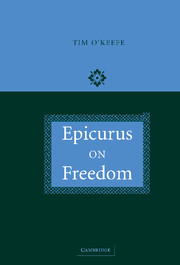Book contents
- Frontmatter
- Contents
- Acknowledgments
- List of abbreviations
- Introduction
- Chapter 1 What sort of an incompatibilist is Epicurus?
- Chapter 2 Lucretius on the swerve and voluntas
- Chapter 3 Aristotle and Epicurus on the origins of character and action
- Chapter 4 Epicurus' reductionist response to Democritean fatalism
- Chapter 5 The swerve and collisions
- Chapter 6 The swerve and fate
- Chapter 7 Epilogue: Epicurus and the invention of libertarian free will
- Appendix: Some texts
- References
- Index
Introduction
Published online by Cambridge University Press: 22 September 2009
- Frontmatter
- Contents
- Acknowledgments
- List of abbreviations
- Introduction
- Chapter 1 What sort of an incompatibilist is Epicurus?
- Chapter 2 Lucretius on the swerve and voluntas
- Chapter 3 Aristotle and Epicurus on the origins of character and action
- Chapter 4 Epicurus' reductionist response to Democritean fatalism
- Chapter 5 The swerve and collisions
- Chapter 6 The swerve and fate
- Chapter 7 Epilogue: Epicurus and the invention of libertarian free will
- Appendix: Some texts
- References
- Index
Summary
One of the most startling and distinctive aspects of Epicurean philosophy is the atomic motion known as the ‘swerve.’ The Epicureans are materialists, holding that the only things that exist per se are bodies and ‘void,’ which is just empty space. Bodies are simply conglomerations of atoms, which are uncuttable, extended bits of ‘full’ space flying through the void as a result of their weight, past motions, and collisions with other atoms. But the Epicurean poet Lucretius writes that if all atomic motion were the deterministic result of past motions and weight, we would not have the ‘free volition’ (libera voluntas) which allows each of us to move ourselves as we wish. Since we evidently do have the power to move ourselves as we wish, there must be a third, indeterministic cause of atomic motion, in addition to weight and past motions – a ‘swerving’ of the atoms to the side at uncertain times and places, which saves us from fate.
In part, this book is an attempt to discern the role the swerve plays in preserving human freedom. However, the swerve cannot be studied in isolation; it must be understood in the context of Epicurus' ethics, philosophy of mind, and metaphysics in general. So the subject of this book is Epicurus' overall theory of human freedom.
- Type
- Chapter
- Information
- Epicurus on Freedom , pp. 1 - 9Publisher: Cambridge University PressPrint publication year: 2005
- 1
- Cited by



